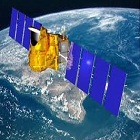Indo-French satellite to boost climate insight
12 October 2011 | EN

The Indo-French Megha-Tropiques satellite will boost tropical climate climate data.
CNES
[CHENNAI] A newly launched Indo-French satellite will help scrutinise weather over the tropics in detail and permit better understanding of the monsoon, cyclones and floods.
The one-tonne ‘Megha-Tropiques’ (Megha means cloud in Sanskrit) was launched along with three other smaller satellites on an Indian rocket ‘Polar Satellite Launch Vehicle’ this week (12 October) from the Indian space port of Sriharikota, an island in the Bay of Bengal, 90 kilometres off Chennai.
The new satellites would help study greenhouse gases, vegetation and land use, and help locate ships at sea.
Megha-Tropiques, perched at an angle of 20 degrees, 867 kilometres above the earth, and orbiting the earth five times daily in a north-south direction, will gather data on clouds including ice formation, water vapour and solar radiation, in a three-year experimental mission.
"It opens up a new era of atmospheric research in the tropical system," Indian Space Research Organisation (ISRO) chairman K. Radhakrishnan said after the nationally televised launch. "This mission will provide a lot of information about the tropical regions and how it contributes to global weather."
The French National Space Centre (CNES) and ISRO jointly developed the instrument for ‘Microwave Analysis and Detection of Rain and Atmospheric Structures’ to study clouds in detail, including ice formation.
CNES separately developed the Sondeur Atmosphérique du Profil d'Humidité Intertropicale par Radiométrie (SAPHIR) payload to study water vapour, and Scanner for Radiation Budget Measurement (SCARAB) to study radiation.
"It is part of a constellation of the Global Precipitation Mission (GPM), an international cooperative mission to track precipitation, such as rainfall and snowfall, around the world," a senior scientist from CNES said after the launch. The GPM is run by the National Aeronautics and Space Agency of the United States and the Japanese Aerospace Exploration Agency.
According to CNES, the data would help scientists understand the processes leading to dramatic weather events affecting the tropical countries, such as hurricanes, systems producing heavy rainfall and processes governing monsoon variability or droughts.
Extreme events such as the El Nino of 1997-98, repeated droughts across parts of Africa, and the Atlantic hurricanes are linked to changing climate trends and point to the importance of studying tropical weather systems in the context of climate change, CNES said.
Roddam Narasimha, chairman from the Indian scientific group for Megha-Tropiques, told the daily, 'The Hindu', that scientists worldwide have not been able to "cash in on the predictability" of tropical weather because global prediction models are not as efficient over the tropics as with higher latitudes.
Source:- http://www.scidev.net/en/south-asia/news/indo-french-satellite-to-boost-climate-insight.html
No comments:
Post a Comment